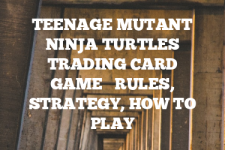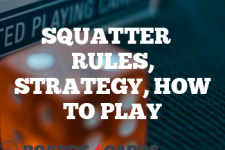Playing the Force: A Guide to Star Wars: Destiny – Cards, Strategy & Play Instructions
Introduction
Star Wars: Destiny is a thrilling collectible card and dice game where players take control of characters from the Star Wars universe and battle against each other. It’s a game that has elements of luck and strategy, with players using decks they’ve built to try and outsmart their opponents. The game was first released in 2016 by Fantasy Flight Games and got some popularity among gaming circles I know for its gameplay and the excitement of collecting cards and dice featuring beloved Star Wars characters.

The game is played with a mix of cards and dice, with each character card having its own corresponding die. Players use these to attack their opponents and defend themselves. The goal is to reduce the opponent’s characters to zero health. Star Wars: Destiny offers a variety of cards, including characters, upgrades, supports, events, and battlefield cards, each with its own role in the game.
Unfortunately, Star Wars: Destiny is no longer in print. Fantasy Flight Games announced the end of the game’s production in early 2020 but you can still buy some starter sets and booster packs from FFG. However, the game still has a dedicated fan base, and many players continue to enjoy it, trading cards and playing in unofficial tournaments.
Quick Tip for Star Wars: Destiny
Always keep an eye on your resources. They’re key to playing powerful cards and can make or break your game.
Rules for playing Star Wars: Destiny
Understanding the rules of Star Wars: Destiny is essential to play the game effectively. Each player starts with a team of characters and a deck of 30 cards. Players take turns activating characters, playing cards, and using dice to deal damage to their opponent’s characters.
The game is played in rounds, with each round consisting of three phases: the Upkeep Phase, the Action Phase, and the End Phase. In the Upkeep Phase, players ready their exhausted cards and gain two resources. The Action Phase is where the bulk of the gameplay happens. Players can take one action on their turn, such as playing a card, using a character or support, or claiming the battlefield. The End Phase is where players check for defeated characters and prepare for the next round.
Characters are the heart of your team, and each has its own abilities and health. Upgrades can be attached to characters to improve their abilities, while support cards provide additional ways to help your team or hinder your opponent. Event cards are one-time-use cards that can have a variety of effects. The battlefield card represents the location where the battle is taking place and can be claimed by a player for a special effect.
Combat is resolved using dice that come with character and upgrade cards. When a character is activated, its dice are rolled, and the results can be used to deal damage, gain resources, or other effects. Players can also use cards from their hand to manipulate dice results or disrupt their opponent’s plans.
Card Types for Star Wars: Destiny
There are several types of cards in Star Wars: Destiny:
- Character Cards: These represent the heroes and villains you control in the game.
- Upgrade Cards: Attach these to characters to give them new abilities or improve their stats.
- Support Cards: These stay in play and provide ongoing benefits.
- Event Cards: Played from your hand for immediate effects.
- Battlefield Cards: Determine the location of the battle and offer unique advantages.
When setting up your deck, you can choose from starter sets or build your own custom deck. Starter sets are pre-constructed decks that are great for beginners to learn the game.
STAR WARS: DESTINY RULES OVERVIEW
THE GOLDEN RULE
If a card’s text contradicts game rules, the card’s text prevails if both can be followed.
PART 1: CARD COMPONENTS
- Affiliation: Hero, Villain, or Neutral indicated at the card’s bottom.
- Colors: Red (Command), Blue (Force), Yellow (Rogue), Gray (General).
- Type & Subtype: Six types (e.g., Character, Event), some with subtypes.
- Title: Identifies the card in the Star Wars universe.
- Abilities: Actions/effects listed on cards.
- Uniqueness: Unique cards are marked (*) and have restrictions.
- Flavor Text: Non-functional text for theme.
- Identification (ID): Set symbol and number for card identification.
- Rarity: Fixed, Common, Uncommon, Rare, Legendary with respective colors.
- Dice Reference: Shows all sides of a card’s associated die.
CARD TYPES
BATTLEFIELDS
- Locations players face off in, chosen at the game’s start.
- Controlled by one player at a time, influences the round’s first action.
- May have abilities upon claiming the battlefield.
PLOTS
- Schemes and strategies players begin with.
- Point value counts toward the 30 point limit, affects team building.
CHARACTERS
- Notable individuals in the Star Wars universe.
- Spend up to 30 points on characters during customization.
- Health determines how much damage a character can take before defeat.
EVENTS
- Tactical actions, twists, or developments occurring during the game.
- Follow card instructions upon playing, then discard.
DOWNGRADES
- Represent bounties, injuries, or negative effects on characters.
- Attach to opponents’ characters and have ongoing abilities.
SUPPORTS
- Represent vehicles, connections, and logistical aids.
- Placed in play area with repeatable or ongoing effects.
UPGRADES
- Represent weapons, gear, or abilities attached to characters.
- Limited to 3 upgrades per card; replaced upgrades reduce new upgrade costs.
DOUBLE-SIDED CARDS
- Introduced in Transformations set, cards have two sides (A and B).
- Flipping doesn’t count as leaving or entering play; retains dice and tokens.
The rules can be complex, especially with card-specific mechanics. Does this cover what you were looking to understand?
How to Play Star Wars: Destiny and Game Mechanics
GAME SETUP
- Placing Cards: Each player displays their character and plot cards faceup, along with matching dice.
- Setting Battlefield: Players set aside their battlefield faceup.
- Deck Preparation: Shuffle a 30-card deck and draw 5 cards.
- Reshuffling and Redrawing: Shuffle back any cards from the hand, redraw to have 5 cards.
- Sorting Tokens: Organize tokens (damage, shields, and resources) into piles; each player gains 2 resources.
- Determining Starting Player: Players roll character dice, and the highest total selects the battlefield. In case of ties, random selection occurs.
- Triggering “After Setup” Abilities: Abilities that activate after setup are triggered.
ROUNDS
Each round has two phases:
ACTION PHASE
- Players alternate turns, starting with the battlefield controller.
- Each player performs one action or passes.
- If both pass consecutively, the action phase ends.
UPKEEP PHASE
Each player:
- Readies exhausted cards.
- Returns dice to matching cards.
- Gains 2 resources.
- Discards to meet hand size, drawing up if needed.
ACTIONS
Players take actions on their turns:
- Playing a Card: Declare intent, check restrictions, pay costs, resolve effects.
- Activating a Card: Exhaust a card to roll its dice into the pool.
- Resolving Dice: Pay costs to apply die effects, returning to the card afterward.
- Rerolling Dice: Discard a card to reroll chosen dice.
- Using Card Actions: Resolve actions specified on certain cards.
- Claiming the Battlefield: Claim control of the battlefield, using its ability.
ILLEGAL ACTIONS
If an action is illegal or incomplete, it’s reversed without triggering abilities/effects. Certain actions can’t be undone.
EXTRA ACTIONS
Additional actions must be immediately taken or declined. They follow the resolution order and don’t join the regular effect queue.
PASSING
Players can pass turns, retaining the option to act later. Certain null actions count as a pass.
GAME END
The game ends in two ways:
- If a player controls no characters, the other player wins immediately.
- If a player has no cards in hand and deck after a round, they lose. If both players meet this condition, the one controlling the battlefield wins.
How to Win at Star Wars: Destiny
To win at Star Wars: Destiny, you need to understand both basic and advanced strategies. Beginners should focus on learning how to effectively use their resources and dice. Intermediate players can start to look at more complex card interactions and timing their actions for maximum effect. Advanced players will need to master deck building and anticipate their opponent’s moves.
Winning strategies often involve controlling the battlefield, managing resources wisely, and knowing when to be aggressive or defensive. It’s also important to understand the synergies between cards and how to create powerful combos.
Best Strategies for playing Star Wars: Destiny game
The best strategies for playing Star Wars: Destiny involve a mix of planning and adaptability. Players should aim to build a deck that has a clear strategy but is also flexible enough to handle different situations. It’s important to balance your deck with a mix of character, upgrade, support, and event cards.
Strategic plays might include focusing on defeating one character at a time, controlling the battlefield to gain its benefits, or saving resources for a powerful play. Sneaky tactics could involve bluffing about the cards in your hand or strategically passing to force your opponent to act first.
Deck Building and Best Cards in Star Wars: Destiny
Deck building is a crucial part of Star Wars: Destiny. A well-constructed deck should have a good balance of characters, upgrades, supports, and events. It should also have a focus on either aggression, control, or another strategic angle.
Best Cards in Star Wars: Destiny
While the “best” cards can depend on your playstyle, some cards are widely recognized for their strength and versatility. Here are a few:
- Force Speed – An upgrade that gives extra actions.
- Ancient Lightsaber – A powerful weapon upgrade.
- Palpatine – A strong character card with powerful dice.
Scenarios
In Star Wars: Destiny, you might find yourself in a variety of scenarios. A common bad scenario is being resource-starved, which you can turn to your advantage by playing low-cost cards and saving up for a big play. A good scenario might be having control of the battlefield, which you should leverage by using its ability to the fullest.
Frequently Asked Questions about playing Star Wars: Destiny Card Game
Here are some common questions and answers:
Q: Can I mix cards from different sets? A: Yes, as long as your deck follows the rules for deck building.
Q: How many dice can I roll at once? A: You can roll as many dice as you have in play for a character or card.
Q: Can I change my deck between games? A: In a tournament, no. In casual play, it’s up to you and your opponent.
Additional Tips and Tricks
When playing Star Wars: Destiny, always be aware of your opponent’s resources and possible plays. Try to predict their moves and plan accordingly. Also, don’t forget to have fun and enjoy the Star Wars theme!
External Links
For more information on Star Wars: Destiny, check out the following links:

A digital native around since the early days of online gaming communities around 2001. An early contributor to the cult gaming site ClanTemplates, Adam has spent years giving free gaming resources to the community. With BoardCards, Adam is most experienced and commonly writing the articles on Strategy multi-player games like Settlers of Catan and Avalon. His first introduction to board games was via Mancala, an Egyptian-origin stone game and one of the oldest known games still played worldwide. Contact me via email



